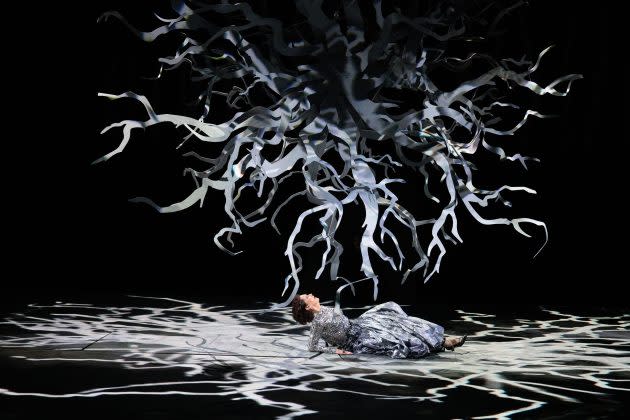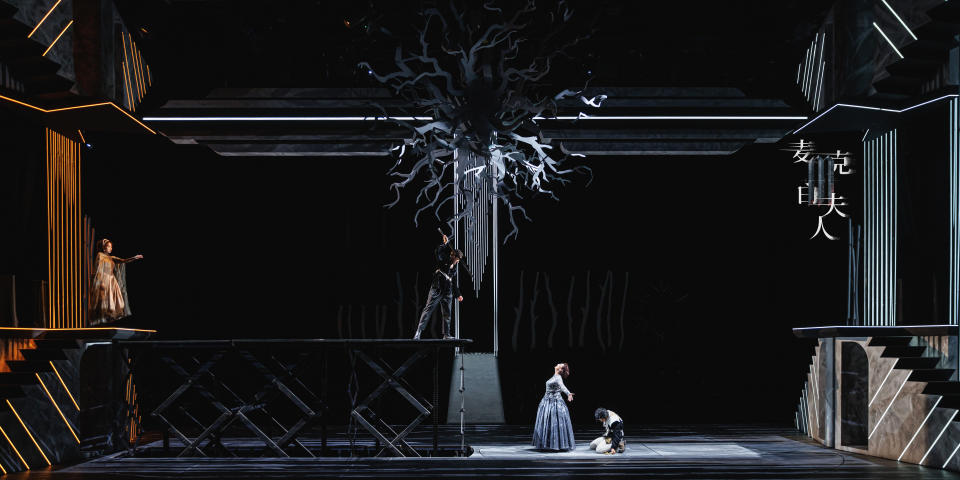Pronounce Designs Costumes for Chinese Adaptation of Shakespeare’s ‘Macbeth’
- Oops!Something went wrong.Please try again later.

Chinese fashion label Pronounce, designed by Yushan Li and Jun Zhou, recently created the costumes for “The New Musical Lady M,” an adaptation of Shakespeare‘s “Macbeth,” which recently made its debut in Shanghai.
The original sung-through musical is directed by the Shanghai-based director Xu Jun and features an original score and lyrics by James Beeny and Gina Georgio, a writing and producing duo based in the U.K.
More from WWD
The English-speaking musical, performed by a cast from China and Europe, will run until June 6 at Shanghai’s Shipyard 1862, a revamped performance hall reimagined by Kengo Kuma, the renowned Japanese architect.
The musical is the headliner for Shipyard 1862’s 2024 and 2025 playbill that includes more than 20 shows.
Li said the project was over six months in the making and features more than 50 looks.
“It was a dream come true to work on this project because doing this in a way reminds me of Alexander McQueen‘s runway shows in the 1990s — so full of life,” said Li. “Theater really gave me the chance to think about creativity more freely.
“The goal was to create a look that breaks free from the constraints of traditional era dressing. We looked to create an amalgamation of medieval silhouettes but also futuristic elements,” said Li.

The costume design was informed and inspired by key art elements created by Pang Hao, the visual artist behind the musical’s promotional visuals, which places the characters amid a pool of dark magnetic fluids, Li said.
In one poster, three versions of Lady Macbeth appear in one setting. “Seeing the three actresses of the same character in one view was an ‘a-ha’ moment for us; we wanted their outfits to look slightly different, so as to look flattering on different body types and have their personality shine through,” said Li.
“From a business perspective, creating different sartorial narratives around the show means that theater buffs will be coming back for a second and third viewing,” added Pang. “This is what makes musicals fun, the rotating cast.”
For Li, the most challenging part about working with a theater troupe was dealing with the movements of the characters and the revolving stage.
“We spent a lot of time learning their choreography and really got to know the actors and to learn about character development,” said Li of the two-hour-long musical.
“We have to take into account a lot more technical elements when designing for a stage that goes up and down a lot, accidentally getting the hemline stuck in the machinery can be catastrophic,” added Li. “The fashion has to be in service of the movement, not the other way around, which can be counterintuitive for a lot of fashion designers.”
The collaboration was also a chance for Pronounce to revisit the Mao suit, a style now synonymous with Pronounce. Lacerated Mao suits, which made their debut in the fall 2021 collection, were initially inspired by traditional ceramic repairing techniques that used gold to put pieces back together. But in the musical, the design hints at the grimace, the darkness and the unraveling of the murderous plot.
“It’s a feeling of psychological warfare, of gradual collapse, and of the characters’ doomed fate,” said Li.
Other signature elements, such as voluminous sleeves inspired by a trip to Lhasa, as well as Pronounce’s signature purple, make cameos in the production.
To highlight the ruthlessness of Lady Macbeth, Pronounced designed a silver gown sharply punctuated by metallic shells, which was a last-minute creation to replace an all-black number. “We also wanted to play with the mirrors on stage and play with her reflections, which are sharpened by her refracting gown in a violent fashion,” said Li.
Best of WWD

